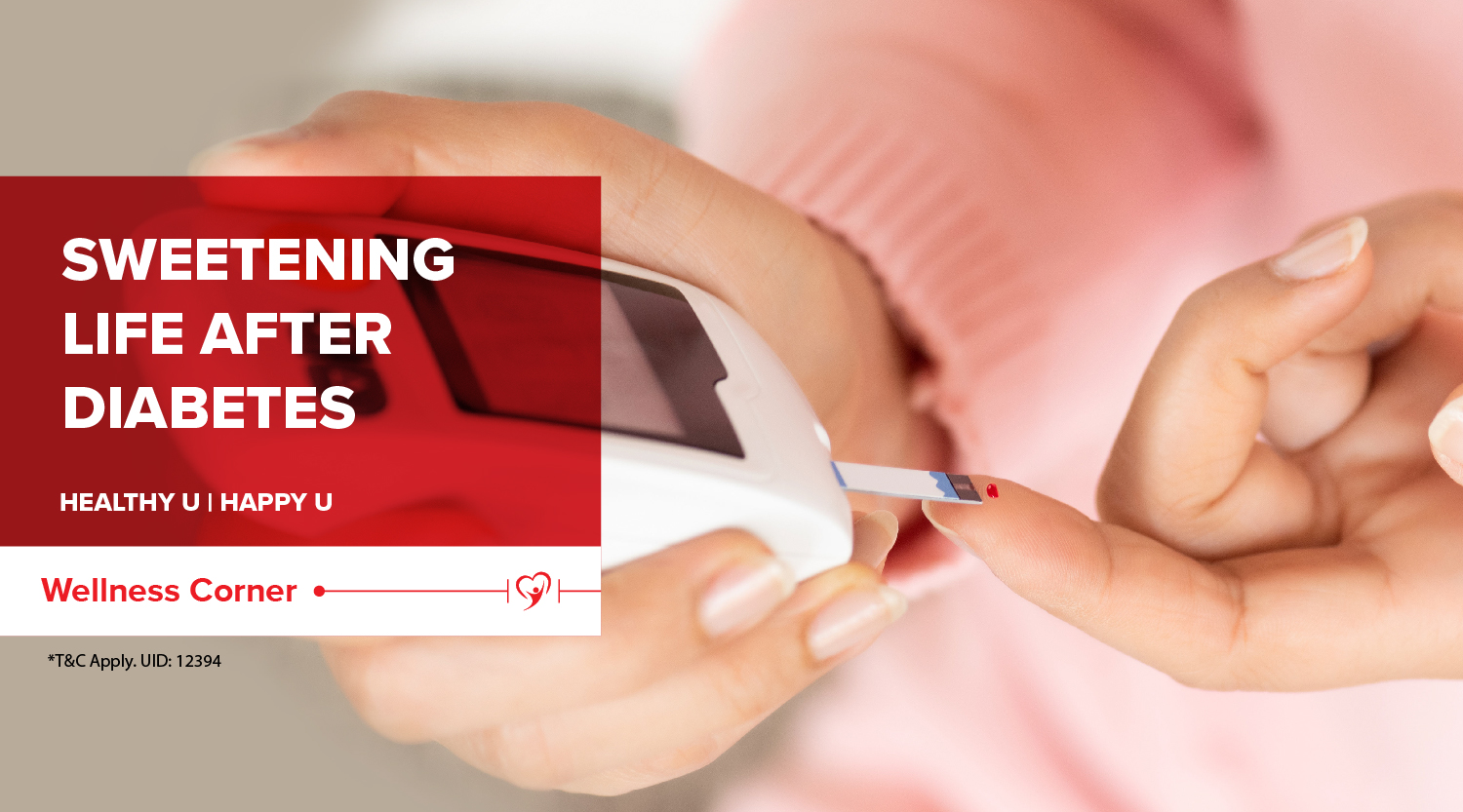

What is Diabetes – All You Need to Know About It
- Overview
- Types
- Causes
- Symptoms
- Risk Factors
- Tests
- Management
- Complications
- Prevention Tips
- Conclusion
Overview
Diabetes is a metabolic condition characterized by sustained high blood sugar levels. Your body gets sugar (glucose) from the foods you eat which is released into your bloodstream and when the blood sugar level goes up, it signals the pancreas to release insulin. Insulin acts as a key and allows the sugar to enter body's cells to be used as energy. The hormone insulin is responsible for moving sugar from blood to the cells for energy.
In case your body does not make enough insulin or doesn’t use the insulin well, glucose will get accumulated in your bloodstream over time and lead to high blood sugar levels or diabetes. If left untreated, the condition can harm your heart, nerves, kidneys, eyes and other organs.
Types of Diabetes
The three most common types of diabetes are:
1. Type 1 Diabetes
Also known as Insulin Dependent Diabetes Mellitus (IDDM), type 1 diabetes is an autoimmune disease where the immune system attacks & destroys cells in pancreas responsible for making insulin. It's yet unclear that what causes this attack.
2. Type 2 Diabetes
Type 2 diabetes occurs when the body becomes resistant to insulin and sugar level increases in the blood. This is called insulin resistance. Here is more on Type 2 diabetes:
- It is the most common type; about 90-95% of diabetics are diagnosed with it.
- Although milder than type 1 diabetes, type 2 can cause certain health complications and increase the risk of stroke and heart conditions.
- The condition is known by other names such as Adult-Onset Diabetes, Adult-Onset Diabetes Mellitus, Diabetes Mellitus Type 2 and Noninsulin Dependent Diabetes Mellitus.
While type 2 diabetes is often confused with diabetes insipidus, do note that the conditions are different. Diabetes Insipidus increases urine output and not blood sugar levels. The condition happens when the kidneys are unable to concentrate urine properly.
3. Gestational Diabetes
This type of diabetes results when a woman develops high blood sugar levels during pregnancy. Women without any history of diabetes can also develop this condition. However, the blood sugar levels usually return to normal after childbirth. In some cases, women with gestational diabetes may develop type 2 diabetes later if they do not lose weight after delivery.
Causes of Diabetes
Type 1 Diabetes
The exact cause of type 1 diabetes is unknown. Usually, it is a result of an autoimmune destruction of pancreatic cells that produce insulin.
Other possible causes inlude:
- Genetics.
- Exposure to viruses and certain environmental factors.
Type 2 Diabetes
This is the most common form of diabetes caused by several factors, including lifestyle & genetic. Type 2 diabetes is primarily the result of 2 interrelated problems:
- Cells in the body become resistant to insulin and hence they don't take in enough sugar.
- The pancreas are unable to produces enough insulin needed to manage blood sugar levels.
Gestational Diabetes
The exact cause as to why some women get gestational diabetes and others don't is yet unknown. Possible causes include:
- Excess weight before pregnancy often plays a role.
- Hormonal changes during pregnancy makes it difficult for the body to process blood sugar efficiently thereby making blood sugar levels rise.
- Women with insulin resistance before pregnancy are more likely to get gestational diabetes.
Symptoms of Diabetes
Type 1 Diabetes
- Feeling thirsty often
- Feeling hungrier than usual
- Urinating frequently
- Sudden bed wetting in children
- Unexplained weight loss
- Mood changes and irritability
- Feeling weak and tired
- Blurred vision
Type 2 Diabetes
- Increased thirst and hunger
- Increased urination
- Unexplained weight loss
- Tiredness
- Blurry vision
- Sores or cuts that take time to heal
- Frequent infections
- Tingling or numbness in the hands or feet
- Darkened skin in the neck and armpits
Gestational Diabetes
- Feeling thirsty often
- Feeling fatigued
- Having a dry mouth
- Increased urination
Diabetes Risk Factors
Certain factors increase your risk for diabetes.
Type 1 Diabetes
Risk of type 1 diabetes increases if you:
- Family history: Having a parent or sibling with type 1 diabetes increases your chances of developing the condition.
- Autoantibodies: These are antibodies that attack and damage the tissues and organs of a body. The presence of autoantibodies can increase the risk of type 1 diabetes.
- Pancreatic injury: Any kind of injury or infection in the pancreas can hinder its normal functioning and lead to type 1 diabetes.
- Other risk factors: Physical stress, surgery and viral conditions can also increase the risk of the condition.
Type 2 Diabetes
Risk of type 2 diabetes increases if you:
- Family history: The risk of type 2 diabetes increases if a parent or sibling has the condition.
- Age: Type 2 diabetes is more common in older adults (45+).
- Body weight: Being overweight or obese increases the risk.
- Body fat distribution: Excess fat in the abdominal region increases the risk.
- Sedentary lifestyle: Lack of exercise and other activities increases the risk. When you are physically active, your body uses glucose to produce more energy and this keeps blood sugar levels in check.
- Blood lipid levels: Low levels of good cholesterol (high-density lipoprotein) and high levels of triglycerides increase the risk of type 2 diabetes.
- Gestational diabetes: Women who developed gestational diabetes during pregnancy are at a higher risk.
- Other risk factors: Those with heart conditions, depression and polycystic ovary syndrome are more likely to develop type 2 diabetes.
Gestational Diabetes
Risk of gestational diabetes increases if you:
- Obesity: Excessive weight gain during pregnancy can lead to gestational diabetes.
- Previous pregnancy: Women with a history of gestational diabetes in a previous pregnancy are at a higher risk of developing it again.
- Family history: Having a parent or sibling with type 2 diabetes also increases the risk.
- PCOS: Women with a history of PCOS are more likely to get gestational diabetes.
- Prediabetes: Being a prediabetic also increases the chances of gestational diabetes.
Tests for Diabetes
Type 1 Diabetes
- Random Blood Sugar Test
- Fasting Blood Sugar Test
- Glycated Haemoglobin (A1C) Testor HbA1c Test
Type 2 Diabetes
- Glycated Haemoglobin (A1C) Test or HbA1c Test
- Random Blood Sugar Test
- Fasting Blood Sugar Test
- Oral Glucose Tolerance Test (OGTT)
Gestational Diabetes
- Oral Glucose Tolerance Test (OGTT)
- Oral Glucose Challenge Test (OGCT)
- Glycated Haemoglobin (A1C) Test or HbA1c Test
Diabetes Management
Type 1 Diabetes
Management of type 1 diabetes include:
- Take medication & insulin as prescribed by health expert.
- Monitor blood sugar levels often.
- Eat a healthy & balanced diet.
- Exercise regularly.
- Maintain a healthy weight.
- Go for regular feet examination & maintain good foot hygiene.
Type 2 Diabetes
Management of type 2 diabetes include:
- Plan well balanced, nutritional meals including high fiber foods, fewer refined grains and fewer starchy vegetables.
- Monitor carbohydrate intake.
- Exercise regularly.
- Maintain healthy weight.
- Check your blood sugar level often.
- Take medication as prescribed by health expert.
Gestational Diabetes
Management of gestational diabetes include:
- Follow a healthy diet.
- Stay physically active.
- Monitor blood sugar levels often to make sure it stays in healthy range.
Diabetes Complications
Type 1 Diabetes
Overtime, type 1 diabetes can affect other major organs. Potential complications include:
- Increased risk of heart and blood vessesl diseases like stroke, heart attack, and high blood pressure.
- Nerve damage in limbs causing tingling, numbness, and burning sensation.
- Nerve damage in digestive system causing nausea, diarrhea or constipation.
- Kidney damange leading to kidney failure.
- Damage to eye blood vessels leading to blindness or other serious conditions such as cataract and glaucoma.
- Prone to developing skin and mouth infections.
- Increased risk of pregnancy complications for both mother and the baby including miscarriage, stillbirth & birth defects.
Type 2 Diabetes
Potential complications of type 2 diabetes include:
- Increased risk of heart disease, stroke, high blood pressure, and narrowing of blood vessels.
- Nerve damage in limbs resulting in eventual loss of feeling.
- Nerve damage in heart contributing to irregular heart rhythms.
- Nerve damage in digestive system.
- Developing chronic kidney disease.
- Increased risk of eyes diseases such as cataract and glaucoma.
- More suscpetible to suffering from skin problems.
- Hearing impairement.
- Slow healing of wounds.
Gestational Diabetes
Potential complications of gestational diabetes include:
For Baby:
- Excessive birth weight causing your baby to grow too large.
- Preterm or Early birth.
- Experience breathing difficulties.
- Low blood sugar levels shortly after birth causing seizures in the baby.
- Higher risk of developing type 2 diabetes in later stage in life.
- Chances of Stillbirth.
For Mother:
- Risk of high blood pressure and preeclampsia.
- Having a C-section delivery.
- Higher risk of developing type 2 diabetes as you get older.
Diabetes Prevention
Type 1 Diabetes
Currently, there's no known way to prevent type 1 diabetes, but there are several research being conducted on preventing the diease.
Type 2 Diabetes
Healthy lifestyle choices can help prevent type 2 diabetes. This includes:
- Follow a healthy and balanced diet.
- Stay active.
- Maintain a healthy weight.
Gestational Diabetes
While gestational diabetes can not be prevented, you can reduce the risk of developing it by adopting healthier habits. This includes:
- Eat healthy and balanced diet which is high in fiber and low in fat and calories.
- Exercising regularly before and after pregnancy can protect you from developing gestational diabetes.
- Start pregnancy at a healthy weight.
- Don't gain more weight than recommended as it increases the risk of developing gestational diabetes.
Conclusion
Diabetes is a chronic condition that can lead to heart diseases, kidney issues and vision loss over time. Although there isn’t any cure for it, making some positive lifestyle changes, like eating a healthy diet, exercising regularly and regulating weight can help manage diabetes symptoms. Diabetics must also take prescribed medications or insulin regularly to keep blood glucose levels in check and avoid associated health complications.
Source: niddk.nih.gov, who.int, healthline, cdc.gov, idf.org, my.clevelandclinic, webmd. , diabetes.org.uk, dtc.ucsf.edu, mayoclinic
Get a right Health Insurance today & protect your savings from unexpected medical expenses.
Controlling diabetes isn’t easy, but with following a bit of discipline and certain lifestyle changes, you can keep your blood sugar under control. Complications of diabetes are a leading cause of hospitalisation. To save yourself from mounting hospital bills and expenses, get a mediclaim policy that gives comprehensive coverage.
Disclaimer: This blog provides general information and discussions about health and related subjects. The information and other content provided in this blog, website or in any linked materials are not intended and should not be considered, or used as a substitute for, medical advice, diagnosis or treatment. Kindly contact your Doctor before starting a new medicine or health regime.

/diabetes_s.jpg?sfvrsn=27944770_2)
/cholesterol-s.png?sfvrsn=2cb77395_2)
/myocardial-infarction-s.jpg?sfvrsn=c30af9c0_2)
/cancer-w.png?sfvrsn=b00ce94_2)
/obesity_s.jpg?sfvrsn=41f27b41_2)












 Car Insurance
Car Insurance  Bike/Two Wheeler Insurance
Bike/Two Wheeler Insurance  Health Insurance
Health Insurance  Pet Insurance
Pet Insurance
 Travel Insurance
Travel Insurance  Home Insurance
Home Insurance  Cyber Insurance
Cyber Insurance  Third Party Vehicle Ins.
Third Party Vehicle Ins.  Tractor Insurance
Tractor Insurance  Goods Carrying Vehicle Ins.
Goods Carrying Vehicle Ins.  Passenger Carrying Vehicle Ins.
Passenger Carrying Vehicle Ins.  Compulsory Personal Accident Insurance
Compulsory Personal Accident Insurance  Travel Insurance
Travel Insurance  Rural
Rural  Critical illness Insurance
Critical illness Insurance 










